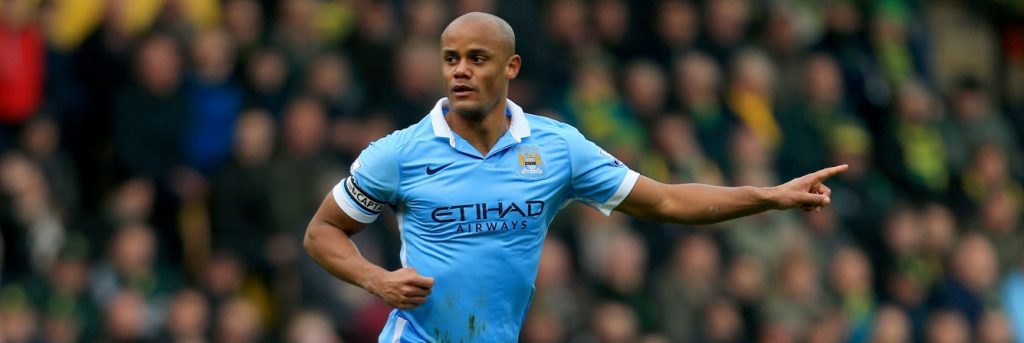When it comes to soccer (err, football) Manchester City captain Vincent Kompany is one of the most widely known centre backs in the world. The Belgian international joined City way back in 2006 and went on to lead his club to victory, helping bring the team its first Premier League title in over four decades in 2012, and then again in 2014.
Known for his aerial ability, mobility, technique and distribution ability, 31-year-old Kompany has been described as one of the best defenders in the sport. He transferred to Manchester City at age 22, where he blossoming into the elite player he is today. Kompany was named to the Premier League Team of the Year for two years in a row in 2011 and 2012 as well as being included in the 2014 team, and won the Premier League Player of the Season in 2012 when his club won the League title. And while his team sits atop the table in the English Premier League, and are setting themselves up for a strong run in the Champions League, the recently-injured Kompany is still a vital part of the organization, even on the sideline.
While Kompany was victorious on the pitch, his first foray into the business world was not nearly as successful. He dabbled in the restaurant business in 2014, when he opened two sports bars in Belgium, he would go on to say, “I regret this decision. We had enough customers, turnover was good, but not enough to cover the costs. So that’s where it ends. Lesson 1 in business: investments are always a risk. You win some, you lose some.”
After suffering a muscular injury during the Manchester derby in 2015, Kompany began to endure a long spell of recurring musculoskeletal injuries which would keep him sidelined for much of past few years. It was during this time that he acted on Lesson 2 in business: education is important.
“I’ve always felt education is very important and this was instilled into me by my late mother from an early age,” Kompany said in an interview.
“When you’re playing football at the top levels, even managing your personal finances starts to become like running a business,” Kompany told the Scottish Sun. “It was important to me that I understood what my accountant was talking about and that I could confidently assess a business plan to take ownership of this area of my life.”
So Kompany enrolled at Alliance Manchester Business School. He received his Global MBA in 2017 after studying part-time for five years. “When you’re playing football at the top levels, even managing your personal finances starts to become like running a business,” Kompany told Sky Sports. “It was important to me that I understood what my accountant was talking about and that I could confidently assess a business plan to take ownership of this area of my life.”
He added: “I’m an entrepreneur at the core so have a natural interest in business. The MBA was about backing this up with academic learning and research.
Xavier Duran, program director at the Alliance Manchester Business School, praised Kompany for his high marks and study habits, pointing out that he had an “excellent” final project and that “his graduation is an impressive achievement.”
That final project was a dissertation that looked at how professional football clubs in the UK can benefit from home game advantage and achieve game-changing levels of improvement. To do so, Kompany examined the link between home form and the atmosphere in a stadium.
“I asked top players around Europe at which grounds they performed well as home players and which intimidated them as away players,” he told the Scottish Sun. “I suggested business could learn how to create a fortress in their institution that rallies people to a common purpose.”
http://https://www.youtube.com/watch?v=DFih_bB3CXI
Kompany has stressed that he isn’t ready to hang up his cleats yet, and has even alluded to entering the business-side of the beautiful game. “Although I want to continue playing football as long as possible, I may look to use this combination of academic learning and years of playing experience in the future.”
He told the Financial Times that he plans to stay involved in the sport, explaining that after working in football for 25 years, leaving after putting in all that time would be “like qualifying as a doctor and giving up medicine in your 30s.”
Kompany also joked that he’ll be one of only a small number of MBAs who are likely to earn less after earning their degree. While that’s true, he’s happy as long as he’s working. “I’d rather give up most of my wealth to have the guarantee that I can carry on working for the rest of my life,” he said.
